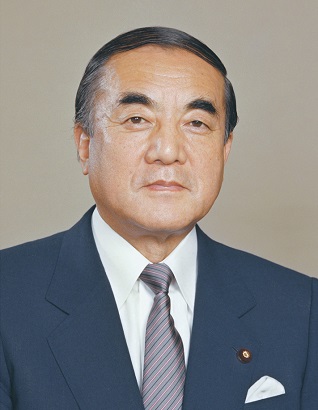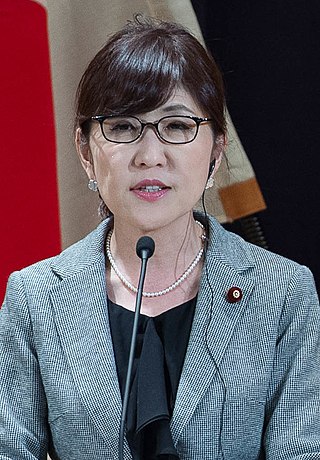
Yasuhiro Nakasone was a Japanese politician who served as Prime Minister of Japan and President of the Liberal Democratic Party from 1982 to 1987. He was a member of the House of Representatives for more than 50 years. His political term was best known for pushing through the privatization of state-owned companies and pursuing a hawkish and pro-U.S. foreign policy.

Yasukuni Shrine is a Shinto shrine located in Chiyoda, Tokyo. It was founded by Emperor Meiji in June 1869 and commemorates those who died in service of Japan, from the Boshin War of 1868–1869, to the two Sino-Japanese Wars, 1894–1895 and 1937–1945 respectively, and the First Indochina War of 1946–1954, including war criminals. The shrine's purpose has been expanded over the years to include those who died in the wars involving Japan spanning from the entire Meiji and Taishō periods, and the earlier part of the Shōwa period.

Itochu Corporation is a Japanese corporation based in Umeda, Kita-ku, Osaka and Aoyama, Minato, Tokyo.

Ryutaro Hashimoto was a Japanese politician who served as the Prime Minister of Japan from 1996 to 1998. He was the leader of one of the largest factions within the ruling LDP through most of the 1990s and remained a powerful back-room player in Japanese politics until scandal forced him to resign his leadership position in 2004. Disgraced, he chose not to stand in the general election of 2005, and effectively retired from politics.
Marubeni Corporation is a sōgō shōsha headquartered in Nihonbashi, Chuo, Tokyo, Japan. It is one of the largest sogo shosha and has leading market shares in cereal and paper pulp trading as well as a strong electrical and industrial plant business. Marubeni is a member of the Mizuho keiretsu.
Kazuhide Uekusa is a Japanese economist, economic analyst, former senior economist at Nomura Research Institute, and chairman of the Three-Nations Research Institute. He was arrested for sexual offenses in 2004 and 2006.

The hundred man killing contest was a newspaper account of a contest between Toshiaki Mukai and Tsuyoshi Noda, two Japanese Army officers serving during the Japanese invasion of China, over who could kill 100 people the fastest while using a sword. The two officers were later executed on charges of war crimes and crimes against humanity for their involvement.
Akira Nakao was a Japanese actor, television personality, and artist from Kisarazu, Chiba. Nakao is represented by the Furutachi Project agency.
Stanislav Alexandrovich Levchenko is a former Russian KGB major who defected to the United States in 1979. He obtained U.S. citizenship in 1989.

Tomomi Inada is a Japanese lawyer and politician serving as a member of the Japanese House of Representatives, representing the 1st Fukui Prefecture since September 2005. She previously served as the 14th Japanese Minister of Defense from August 2016 to July 2017, resigning in response to a cover up scandal within the Japanese Ministry of Defense. She spent time as the Chairwoman of the Policy Research Council of the Liberal Democratic Party in her fourth term as a member of the House of Representatives in the Diet. She is a native of Fukui Prefecture.

Tatsuya Fuji is a Japanese actor. He was born in Beijing and raised in Yokohama. In 1962, Fuji joined Nikkatsu Company and began his acting career with small roles in Nikkatsu film. In 1968, Fuji married actress Izumi Ashikawa. He gained popularity through his role in Jikandesuyo on TBS.
The Toshiba–Kongsberg scandal, referred to as the Toshiba Machine Cocom violation case in Japan, unfolded during the final period of the Cold War. It centered on certain Coordinating Committee for Multilateral Export Controls (CoCom) member nations who transgressed foreign exchange and foreign trade laws by exporting machine tools to the Soviet Union. These tools, when combined with Kongsberg numerical control (NC) devices manufactured in Norway, contravened the CoCom agreement. The equipment allowed the submarine technology of the Soviet Union to progress significantly as it was being used to mill quieter propellers for Soviet submarines.
Shigeru Nakanishi is a Japanese artist from Tokyo, Japan.

Uichiro Niwa is a Japanese diplomat and businessman who served as the Ambassador of Japan to the People's Republic of China and president and chairman of Itochu Corporation. Chairman of The Society of Global Business (SGB)

Pride, also known as Pride: The Fateful Moment, is a 1998 Japanese historical drama directed by Shunya Itō. The film, based on the International Military Tribunal for the Far East of 1946–48, depicts Japanese prime minister Hideki Tojo as a family man who fought to defend Japan and Asia from Western colonialism but was ultimately hanged by a vengeful United States. Shot at a cost of ¥1.5 billion and partially funded by a right-wing businessman, Pride was one of the highest-grossing Japanese films of 1998 and was nominated for two Japan Academy Prizes. Although the filmmakers intended the film to open dialogue on Japanese history, it was controversial in China, South Korea, and Japan owing to concerns of historical denialism.
Itochu Techno-Solutions Co., Ltd. is a Japanese systems integrator based in Kasumigaseki, Chiyoda, Tokyo. It is a publicly traded subsidiary of Itochu Corporation.
The Tonghua incident was a mass killing of rebelling Japanese soldiers that occurred on 3 February 1946 in southern Jilin, China.
Kunitori Monogatari is a historical novel by Japanese novelist Ryōtarō Shiba. It was serialised in Sunday Mainichi from August 1963 to June 1966.
Akira Onodera is a Japanese actor and narrator. He is well known for his role as Denka in Taiyō ni Hoero!. He made his television debut in 1969 with Panto Akogare.









